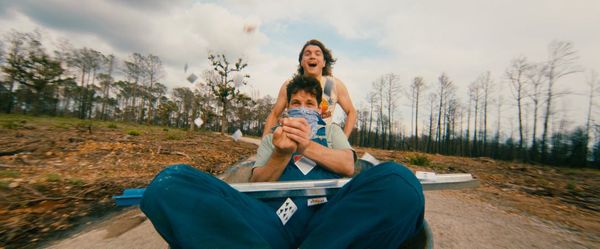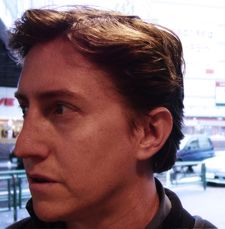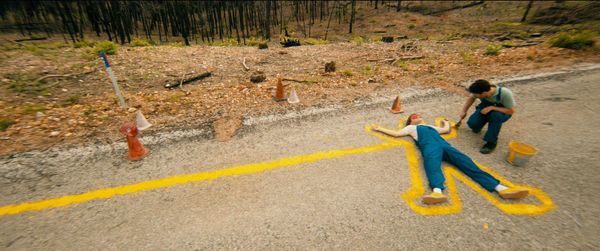 |
| Emile Hirsch as Lance and Paul Rudd as Alvin. 'I do think that every footstep we take on this earth makes some sort of noise.' |
When I catch up with him the next day to talk about his kind of funny/kind of sad buddy movie starring Paul Rudd and Emile Hirsch - and his upcoming Nicolas Cage film Joe and Al Pacino starrer Mangelhorn - he admits: "It's still kind of chaotic. It's just a very unusual flow of water that's being dumped on Austin, Texas, at the moment. I've just got a big mud pit in my backyard at the moment, so my kids are having fun playing in that.
 |
| Director David Gordon Green, 'I start production next week on this movie, so
I'm in the thrill of the rollercoaster until mid-December.' Photo: Sundance Institute |
Curveball is a good word and one that could be used both for the path of David Gordon Green's career and the trajectory of this film, which sees the aspiring-to-profundity Alvin (Rudd) take to the road with his young dissolute brother-in-law Lance (Hirsch) to paint road markings through the backwaters of Texas. Green's output has been eclectic, from his indie beginnings with films such as George Washington and All The Real Girls to more mainstream comedic films including Pineapple Express. Prince Avalanche, which premiered at the Sundance Film Festival earlier this year, flirts with both melancholy and laughs, which may make it seem too chaotic to some, and yet its loose structure and shifting tone gives scope for Green to explore through his two hapless anti-heroes, our relationships with others and the world we live in.
The environment is a big part of the movie and there's a two-way street between it and the men. The wooded spaces may affect the way they look at their lives but there are also signs of them poisoning it to an extent, such as when they dump paint into a creek. Green says he hadn't really considered it from the perspective of their influence on their surroundings.
But he adds: "I do think that every footstep we take on this earth makes some sort of noise. And one of the things I'm exploring in this film - and I have in several films - is the relationship that people or society has with nature. I've always been fascinated by a tree growing through the concrete - man dumps some cement on a sidewalk and Mother Nature says, 'Give it back' and pushes a tree through it to mess it up. I think there's a nice push and pull that, civilised as we think we are, we're still in someone else's habitat, trying to carve our cave."
A key scene in the film involves Alvin - on a weekend in which Lance has headed back to the city - roaming the woods alone and coming across a woman picking through the ruins of a burntout house for anything that had not been incinerated. It's a profound moment, and Green reveals it wasn't pre-planned and that Joyce's story is a real one.
 |
| 'I like to set foot in the chaos and run with the circus, then step back from it and absorb it and process it and keep my mouth shut for a while. |
Joyce and her husband Mac had lost virtually all their belongings when a wildfire in Bastrop County - the worst in the state's history - ripped through an area east of Austin, claiming four lives and destroying almost 500 homes.
"When we met her, and saw the kind of beautiful, fragile story that I had to say - that I found very unusual," says Green. "She was a member of a very exclusive club of female pilots, so her pilot's licence was a very big part of her identity, and the log book that counted the miles, that really gave her a sense of accomplishment. So there was this really interesting, profound effect that fire had had on her life and I was just very interested in her.
"All of a sudden there's this authentic, very intimate voice that becomes a part of his strange story. He's a weird character and it was our own discovery - Paul and I - as we were seeing what that character would do on that weekend. None of that was scripted it was just, let's spend some time wandering around and see what this Alvin character does when no one is looking. That's when we met Joyce and we thought, of course, if we've got someone this brilliant to integrate into the movie, why not take advantage of the opportunity and see what that says about our character? I think it really evolves the audience's perception of the tone of the film after we've met her. All of a sudden we've transitioned from a strange little buddy movie to something that has a significant emotional presence.
"It was a 65-page script - a typical script is over 100 pages - so a loose script. We shot all that and we also used it as an opportunity to take those concepts and ideas and roll film on the unexpected and be spontaneous with it and do some improvisation. But I think there's probably less than you think. There's certainly less than I thought. I think after production I would have given you a different answer, but then, the more Paul and Emile have talked me through the reality of its resemblance to the script, I think there is a little bit more sticking to the engineering and architecture of it than I thought."Green, who admits "my greatest asset is if I can keep being friends with actors", is a long-time pal of Hirsch and Rudd and says that the movie was designed to be a fun enterprise in which he concentrated 100 per cent on the performances.
"I've got my tried and true cinematographer Tim Orr to take care of the visuals and my long-time production designer Richard Wright to make sure the sets look cool and the art direction's killer, so I don't really have anything to worry about other than designing really great characters for the actors. They didn't have drivers taking them to set every day - we were shooting about an hour outside town. It was a very low-end production but, at the same time, 100 per cent of every day was work for the two of them and me communicating about characters. It wasn't them sitting round for days on end waiting for the next close up - they were utilised all the time. It was a 16-day shoot. I've spoken to them about it and they've said, 'Let's do it again.' At the end of the day, it's about them. It's not about a cool shot, it's not about this crank shot that's unbelievable, it's about these performers. Certainly in Avalanche, certainly in Joe, and Mangelhorn was engineered from the get-go for Al. It's more urban, it's a little more civilised."
 |
| 'One of the things I'm exploring in this film - and I have in several films - is the relationship that people or society has with nature.' |
"For me, since I was a kid, I like to set foot in the chaos and run with the circus, then step back from it and absorb it and process it and keep my mouth shut for a while. It's a really funny thing about even the moviemaking process. We'll be in production and it's asking a million questions and the adrenaline of trying to fight the sunlight and get all your day done before everybody goes home and all that stuff. Then when it's over, I just disappear for about a month, even before I start to edit. I just go into hiding - go climb a mountain and go camping and try to screw my head back on straight because it gets pretty crazy.
"Then you come back up into the circus for the publicity and the marketing of the movie and try to collaborate with the actors to give the flick a voice. It really is a balance for me because I love the insanity. I love going to other countries and jumping into unusual environments and learning about it and filming in it and working with new crews, new stories, new actors and really taking advantage and exploiting this profession I have for all the chaos and education that it's worth. But then, I also like just chilling out and reading a book and listening to music and not messing with anybody.
Right now, it seems silence is unlikely, with Prince Avalanche released across the UK this week, relationship drama Joe - starring Cage and Mud's Tye Sheridan - making its way round the festival circuit and the shooting for Mangelhorn, about a man coming to terms with his past, just about to start.
"This is an unusual time," says Green. "This has been about a year and a half when one project has bled into the next, so I haven't had the downtime, other than when I went over to Europe a few days early for Venice and took a week to walk around the Italian countryside, which is something I'd never done before. It was kind of essential in preparing myself to have the energy to be able to push through until the end of the summer. I start production next week on this movie, so I'm in the thrill of the rollercoaster until mid-December. Then, I'm going to go to a snow-capped mountain somewhere and hole up in a cabin."
But for now, the only Avalanche is in cinemas.
Prince Avalanche is out across the UK now and out on DVD in the US. Joe does not have a release date on either side of the Atlantic yet but is currently touring the festival circuit.
 |
| Emile Hirsch and Paul Rudd in Prince Avalanche. 'At the end of the day, it's about them.' |





















